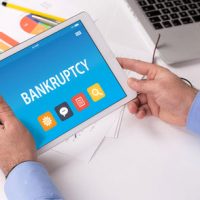Converting a Chapter 13 Bankruptcy to a Chapter 7

A Chapter 13 bankruptcy offers some advantages over a Chapter 7, but it is not for everyone. As an example, you don’t need to hand over non-exempt property, such as your car or investment property, to the trustee in a Chapter 13. However, you do have to complete a repayment plan that can last up to three or five years. During that time, you might realize that you can’t continue with the Chapter 13 plan, in which case you should consider converting to a Chapter 7.
Identify Why You Want to Convert
Some consumers start a Chapter 13 with the best intentions but quickly realize they need escape hatch. For example, some people convert for the following reasons:
- They realize they can’t make payments on a repayment plan for another 3-5 years.
- They decide they don’t want to save their non-exempt property but instead are prepared to turn it over to the trustee.
- They realize they are in line for a big bonus or promotion at work. This increased income will increase their disposable income, which means they will pay more back to creditors under a Chapter 13.
Everyone’s situation is unique, and there is no “one size fits all” approach. Instead, discuss your reasons with a qualified bankruptcy attorney.
Check if You Qualify for a Chapter 7
A Chapter 7 bankruptcy is reserved for those debtors who truly cannot afford to pay their debts. To weed out those who have resources to pay, you must pass a “means test” before you can file. There are two ways to pass:
- Compare your income to the median income for a family of your size in your state. If you are below the median, you automatically pass the means test.
- Look at your income in relation to your debts. If you have insufficient disposable income, you might also qualify.
The means test can be tricky, especially if your income is over the median, so consult with a South Florida bankruptcy attorney to discuss whether you qualify.
File the Necessary Paperwork
You can convert to a Chapter 7 by talking to the trustee and then filing the necessary motion. You might also have to attend a hearing before the judge, who is ultimately responsible for approving (or rejecting) a conversion.
Speak with your attorney ahead of time to understand your obligations after conversion. For example, you will need to do the following:
- Provide a list of debts you have incurred after starting your Chapter 13 case
- File required statements and schedules
- File information about income used for the means test
- File your Chapter 13 debt repayment plan (if not already filed)
- Provide other documents
Your bankruptcy attorney can help ensure you provide the court with all necessary forms and documents.
Speak to a Plantation Bankruptcy Attorney about Conversion
You are not the first debtor to want to get out of a Chapter 13 bankruptcy. To talk with an experienced attorney about your options, please call Nowack & Olson in Plantation today. We offer a free, no obligation initial consultation to all potential clients.
Resource:
flsb.uscourts.gov/sites/flsb/files/documents/forms/Order_Converting_Case_Under_Chapter_13_to_Case_Under_Chapter_7_%28LF-12%29.pdf
